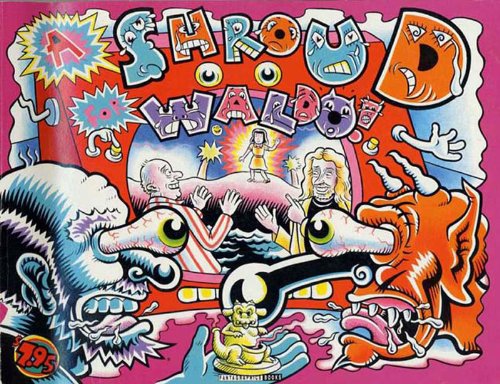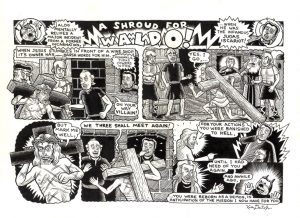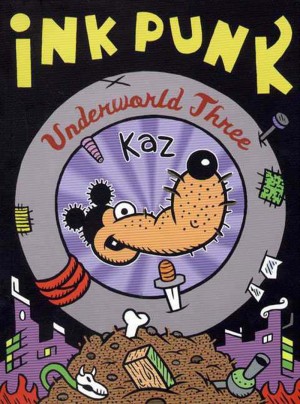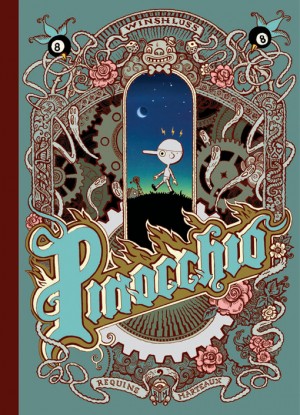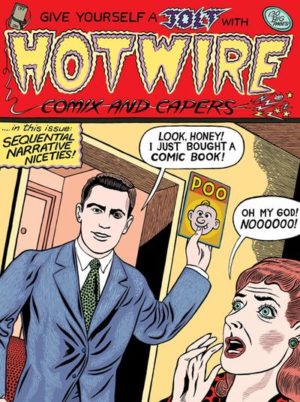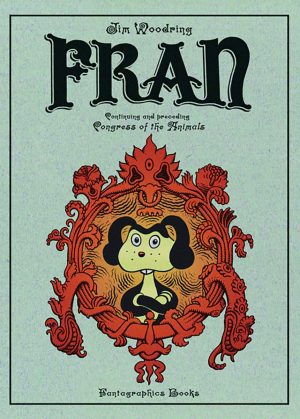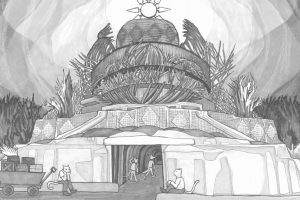Review by Graham Johnstone
Kim Deitch continues to weave his meta-narrative featuring hard-living cat Waldo, a character he devised in the 1960s and whose earliest strips are collected as All Waldo Comics. When the L.A. Weekly finished the page a week serialisation of Deitch’s Hollywoodland, he began A Shroud for Waldo.
Deitch’s narrative and publishing history mirror each other, with multiple hiatuses, and picked-up threads. His development of a comix meta-narrative across platforms and formats is perhaps unparalleled. Waldo is (outwardly, at least), a cat evoking the anthropomorphic black felines of early cartoons and animation. However, Waldo is thoroughly removed from a family-friendly context. Despite the candy-coloured cover and anthropomorphic cartoon faces on the logo, this is emphatically not for children.
Waldo is actually a hard-living hedonist, sometimes presented as a delusion of alcoholic ‘resting’ animator Ted Mishkin, and other times a willfully autonomous being. The current volume reconciles those elements, with an explanation (delivered by guest-star Jesus, who ought to know) that Waldo is a supernatural creature from the-downstairs-place. He’s been in a “…dormant state […] visible only to drunks and other delusional types.” Aaah. It further transpires that Waldo has a history with Jesus, who is now offering the chance of redemption. This is the call to adventure that proposes to take Waldo from his settled world of back-alley drinking, and into the unknown.
The last and longest story in the earlier All Waldo Comics, ‘Mrs Holla and the Magic Ring’ had no mention of the cat at all, focussing instead on inventor Buster Braun and his daughter Evie. However, this volume interweaves the Brauns’ stories with Waldo’s.
A Shroud for Waldo is a fascinating, intricate, imaginative story, that develops multiple elements of Deitch’s meta-narrative. The elephant in the room is the inclusion of Jesus (featured image and cover, centre-right), and the shroud of the title’s referencing the famous relic in Turin. Surprisingly, ‘Jesus’ starred in what may be the first underground comic, nevertheless, this is hardly a move with obvious appeal to Deitch’s seeming demographic of counter-culture survivors, hipsters, and pop-culture connoisseurs. The depiction of Jesus here is neither extreme of iconoclasm or hagiography, he simply acts as a ‘supernatural helper’, or a mentor/wizard archetype. The artwork is also amongst Deitch’s best. However, Christian and atheist alike, may find this element of the story an odd misfire. Thirty years later though, Deitch would revisit Jesus, in Reincarnation Stories, suggesting this was no passing whim.
Reading the books in order highlights both Deitch’s artistic development, and the intricate weaving of his meta-narrative. However each is self-contained, so there’s no need to hold off enjoying them until you gather the set. The next (created) Waldo comics, are collected as The Boulevard of Broken Dreams.
